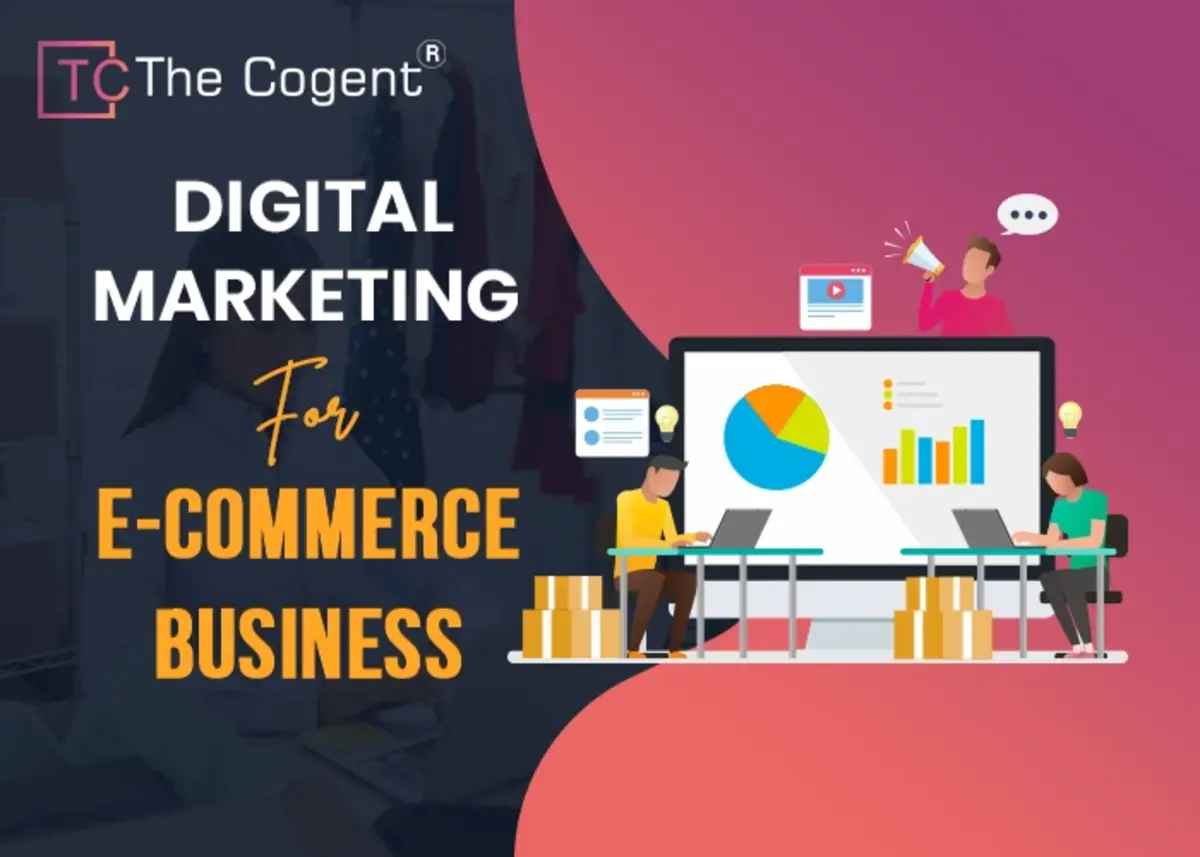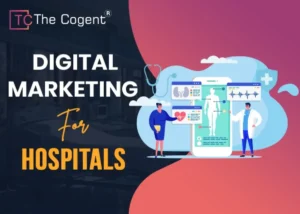In the ever-changing realm of E-commerce, digital marketing has emerged as the linchpin of success for online businesses. As we step into 2024, the landscape of digital marketing continues to evolve, revolutionizing how Ecommerce ventures promote and sell their products or services. In this updated guide, we delve into the best channels and strategies of digital marketing for E-commerce businesses. From Search Engine Optimization (SEO) as well as Search Engine Marketing (SEM) to Content Marketing, Email Marketing, and Social Media Marketing, we explore the diverse arsenal that businesses can leverage.
Additionally, we unravel the significance of conversion rate optimization and customer retention strategies. Emphasizing the benefits of digital marketing for E-commerce, this guide sheds light on the pivotal role it plays in reaching wider audiences, fostering engagement, and ultimately driving growth and profitability for online businesses.
What is E-commerce Online Marketing?
Ecommerce Online Marketing refers to the comprehensive range of digital strategies and tactics employed by online retailers to promote and sell their products or services on the internet. It encompasses various channels such as Search Engine Marketing (SEM), Search Engine Optimization (SEO), Social Media Marketing, Content Marketing, Email Marketing, and Affiliate Marketing. The primary objective of Ecommerce Online Marketing is to attract targeted traffic, engage potential customers, and convert them into loyal buyers, ultimately driving growth and profitability for the Ecommerce business. Through the use of innovative techniques and data-driven approaches, Ecommerce Online Marketing enables businesses to enhance their online visibility, expand their reach, and establish a strong brand presence in the competitive digital landscape. Digital Marketing Company in Jaipur use the best E-commerce marketing strategies to boost business growth.
10 Best Channels of Digital Marketing For E-commerce Business
1. Search Engine Optimization (SEO)
Ecommerce SEO remains one of the most crucial components of E-commerce digital marketing. It involves optimizing the website and its content to rank higher in the search engine results for relevant keywords and phrases. By achieving better rankings, Ecommerce businesses can increase organic traffic and enhance their visibility, leading to higher chances of attracting potential customers.
2. Search Engine Marketing (SEM)
SEM complements SEO efforts and includes paid search advertising on platforms like Google Ads. E-commerce businesses bid on keywords to display their ads at the top position of the search engine results, attracting immediate visibility and potential customers. The advantage of SEM is its quick impact and ability to reach targeted audiences based on specific demographics, interests, and search behaviour.
3. Content Marketing
In Digital Marketing For E-commerce, content marketing is about creating as well as distributing valuable, relevant, and consistent content to attract and retain a clearly-defined target audience. E-commerce businesses can leverage content marketing through blogs, articles, videos, infographics, and more to showcase their expertise, provide helpful information, and build brand authority, thereby engaging potential customers.
4. Email Marketing
Email marketing is a powerful tool to establish direct communication with customers and potential buyers. By sending personalized and targeted emails, E-commerce businesses can nurture leads, promote products, announce sales, and build lasting relationships with their audience. Email marketing also plays an important role in re-engaging inactive customers and driving repeat purchases.
5. Social Media Marketing
In Digital Marketing For E-commerce, social media platforms continue to dominate the digital landscape, making social media marketing a vital channel for E-commerce businesses. By creating engaging content, running targeted advertisements, and interacting with followers, E-commerce brands can strengthen their online presence, drive traffic to their business websites, and foster brand loyalty.
6. Affiliate Marketing
Affiliate marketing is a performance-based strategy where e-commerce businesses partner with affiliates who promote their products or services on their platforms. Affiliates earn a commission for every sale generated through their unique affiliate link. This approach not only expands the brand’s reach but also ensures that marketing expenses are tied to actual conversions.
7. Ads are the Key
In Digital Marketing For E-commerce, paid advertising through various online channels is crucial for E-commerce businesses. It allows brands to reach a broader audience, increase brand awareness, and drive targeted traffic to their websites. Besides search engine advertising, social media platforms offer robust ad targeting options that enable businesses to reach their ideal customers efficiently.
8. Influencer Marketing
Influencer marketing is gaining popularity in the Ecommerce industry. Collaborating with influencers who have a significant following and influence over the target audience can lead to increased brand exposure and credibility. Influencers can promote products through sponsored posts, reviews, and endorsements, driving traffic and sales to the Ecommerce website.
9. Conversion Rate Optimization
In Digital Marketing For E-commerce, conversion rate optimization (CRO) focuses on improving the percentage of website visitors who complete a desired action, like making a purchase or signing up for a newsletter. By analyzing user behaviour, testing different elements, and optimizing the website’s design and functionality, Ecommerce businesses can enhance their conversion rates and maximize revenue.
10. Customer Retention Strategies
While attracting new customers is crucial, retaining existing ones is equally important for e-commerce success. Implementing customer retention strategies, such as loyalty programs, personalized offers, and exceptional customer service, can encourage repeat purchases and foster brand loyalty.
Best E-commerce Digital Marketing Strategy
Establish Objectives Guided by Industry Benchmarks
To create a successful E-commerce digital marketing strategy, businesses must first set clear and measurable objectives. These objectives should be guided by industry benchmarks and tailored to the specific needs and goals of the E-commerce venture. For instance, an objective could be to increase online sales by 20% within the next six months.
Divide Your Strategy into Actionable Tactics
Once the objectives are set, the next step is to divide the strategy into actionable tactics. Each digital marketing channel should have its specific tactics aligned with the overall business objectives. For example, if the goal is to enhance brand awareness, the tactics may include running social media ad campaigns and collaborating with influencers.
Delight Your New and Long-Term Customers
While attracting new customers is essential for startups, providing an exceptional experience to existing customers is equally crucial. Delighting customers through personalized communication, prompt customer support, timely delivery, and effective digital marketing strategies can lead to positive reviews, word-of-mouth referrals, and increased customer loyalty. Digital marketing for startups plays a vital role in reaching and engaging both new and existing customers, ensuring a strong online presence and effective communication channels.
Benefits of Digital Marketing for E-commerce
- Expanded Reach and Targeting: Digital marketing enables E-commerce businesses to reach a global audience and target specific demographics, interests, and behaviours, ensuring efficient use of marketing resources.
- Enhanced Customer Engagement: Through content marketing, social media, and email campaigns, E-commerce brands can engage customers actively, creating meaningful relationships and encouraging repeat purchases.
- Improved ROI and Cost-Effectiveness: Digital marketing for E-commerce allows businesses to track and measure the performance of their campaigns, ensuring that marketing investments yield a positive return on investment (ROI).
- Real-Time Data and Analytics: E-commerce digital marketing provides valuable data and analytics, enabling businesses to make data-driven decisions, identify trends, and optimize their marketing efforts.
- Increased Brand Visibility and Authority: By implementing SEO, content marketing, and social media strategies, E-commerce businesses can enhance their online visibility and establish themselves as industry authorities.
- Personalization and Targeting: Digital marketing enables businesses to personalize marketing messages and offers, catering to individual customer preferences and increasing the chances of conversion.
Conclusion
Digital marketing stands as the cornerstone of success for E-commerce businesses in 2024 and beyond. Through its diverse channels and effective strategies, online retailers can reach a global audience, engage potential customers, and foster brand loyalty. By focusing on establishing clear objectives, implementing actionable tactics, and delivering exceptional customer experiences, e-commerce ventures can maximize their growth and profitability.
The benefits of digital marketing for E-commerce businesses include expanded reach, enhanced customer engagement, improved ROI, and access to real-time data and analytics. To stay competitive in the ever-changing digital landscape, E-commerce businesses must embrace the power of digital marketing and adapt to the latest trends and technologies. With its ability to drive traffic, increase conversions, and build brand authority, digital marketing remains the driving force behind the success of E-commerce in the digital age. According to the Best SEO Company in Jaipur, strong SEO is important to boost sales of e-commerce business



